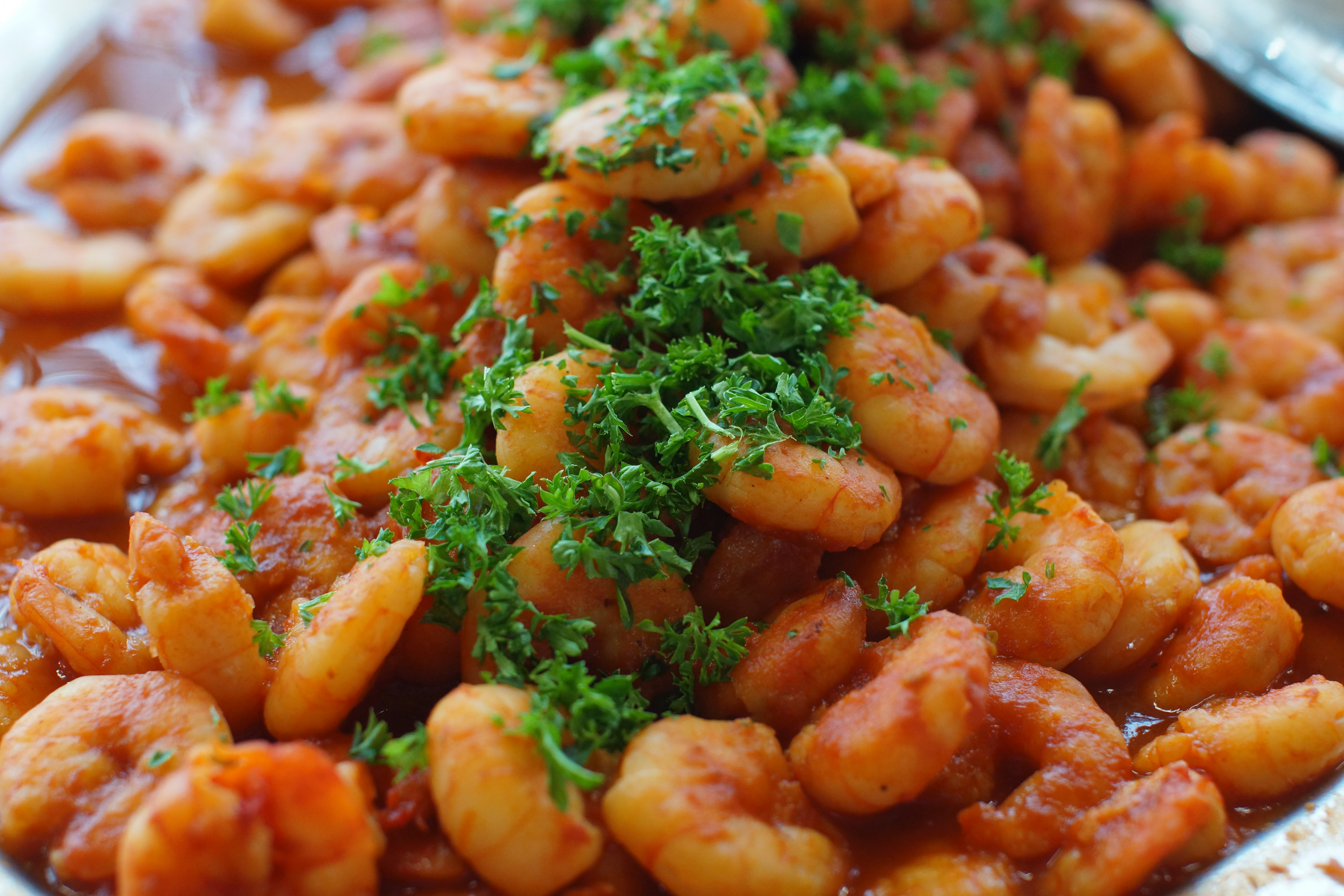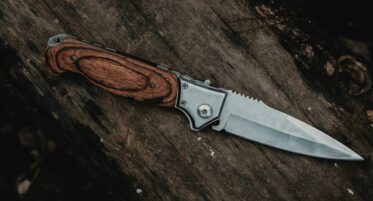
Prompt Images
Something Stinks: Fending Off A Pouch Of Shrimp And Knives — {All You Can Eat}
His clammy palm landed on her shoulder as he sidled up to the trough. He leaned into her, forcing her up against the icy buffet table.
“I’m old. I’ve been through it all. You gotta help me, baby. Pile as many of them shrimp as you can on your plate. Don’t waste your time with the other stuff. It’s all peasant food.”
Helena had learned not to flinch when Uncle Lenny touched her or came so close she gagged at the smell of Johnny Walker and Salems on his breath. His presence awakened an impulse for bulimia. No need to shove two fingers down her throat when the old man was around.
She slithered away, leaving him to balance a pyramid of peel-and-eat shrimp.
Moving to the other end of the salad bar—passing the frenzied suburbanites scooping up globs of congealed salads oozing in mayonnaise that made re-hydrated cranberries indistinguishable from diced canned beets—she carefully assembled a mix of greens, cherry tomatoes, cucumbers, and radishes, picking from the bottom of the metal containers to avoid as much contamination as possible. At least Lenny and the other shrimp-crazy old drunken men kept their spittle away from fresh vegetables.
“You ain’t got no shrimp, babydoll,” Lenny said, collapsing into the only chair at the round corner booth. “Ain’t no point in wastin’ your time on that rabbit food when you got all them gorgeous shrimp.”
There was plenty of space at the table, and Helena had scooted into the torn faux leather booth as far away from him as possible, her legs clamped together to avoid any contact.
“Nick, your daughter ain’t eatin’ no shrimp,” Lenny said, fiddling with his mustache and petting his beard. “She’s a smart gal. She should know better than to load up on grass when there’s all the shrimp in the world for her takin’.”
Desperate not to offend his older brother—who had entered their lives suddenly some three months earlier when Lenny’s wife died and he showed up at a family wedding in New Jersey—Nick shrugged his broad, athletic shoulders and smiled. His crystal blue eyes sparkled along with his meticulous teeth, making it impossible for an outsider to detect his discomfort.
Lenny was much better as a comedic legend, an urban myth.
The stories Helena had heard for years were fodder for low-budget mobster movies. Lenny had escaped abject poverty in Newark for Texas as a teen, after screwing over the DeCavalcante and Genovese crime families. Nick, a kid at the time, saved every penny from his odd jobs including delivering ice from a motor-truck, to pay off Lenny’s debts. Lenny came to “grieve” with Helena’s family in Massachusetts after the wedding and never left. He quickly found a “lady friend” who became his live-in companion without a first date.
“I’m going to hurl,” Helena whispered to her sister, Cassandra, four years her junior. “He’s so disgusting.”
“He’s our only uncle,” Cassandra said, parroting Nick’s mantra for why we needed to respect family. Blazing through pubescent development, Cassandra was often mistaken for the older sister by men like Lenny who measured maturity by the size of a girl’s breasts.
Helena had been to that Beefsteak Charlie’s on the cusp of the Springfield, Massachusetts suburb where she grew up a few times with her friends’ families because kids ate free while adults guzzled unlimited pitchers of swill lager and barely-quaffable wine. Nick wasn’t a drinker, but did anything to please Lenny. “Anything” included letting his two daughters drink “liquid death,” sugary soda foam overflowing from the same cheap plastic pitchers.
It had rained so hard for hours that the strip mall parking lot was flooded.
Helena had stepped into a pothole, destroying her new white Nike Classic Cortez, the first sneakers she owned that weren’t orphaned on the clearance rack at Marshall’s. Focusing on the material loss of her prized trainers and the goosebumps sparked by the unwelcome blasting central AC was a diversion from the reality that Uncle Lenny’s whims were ruling their lives.
“Babydoll, if you ain’t gonna eat shrimp, do your only uncle a favor and put these steak knives into your purse,” Lenny said, cocktail sauce dribbling onto his facial hair.
“I don’t have a purse,” Helena said.
“You got that jacket with a pocket in the front big enough to take home everythin’ on this table,” he said.
Helena wished she hadn’t worn the packable windbreaker that folds into the front pouch when it’s not being used to smuggle cheap cutlery.
“I have to use the toilet,” she said, looking away from the table as she walked away.
Helena didn’t need to pee. She didn’t have a brush to smooth her damp hair. She contemplated bulimia, but she’d skipped breakfast and hadn’t touched her salad, so it would be a fruitless extraction of bile.
Staring into the mirror, she acted out a fantasy scene at the table, imagining she told off Lenny.
She gestured with her hands for emphasis, explaining he’s the lazy fool who doesn’t understand the value of labor involved in cleaning, peeling, and cutting up fresh vegetables, even though it was unlikely that Beefsteak Charlie’s washed anything. She loved shrimp, but not the tiny, slimy kind that looked like monster Sea Monkey starters. Besides, peeling them left behind the yucky veins or “shrimp poop.”
Everyone had moved on to the main course, the only food served to the table alongside the diabetic-coma-inducing pitchers, when Helena returned from her toilet trip.
“Didn’t know where y’all went. We were ready to call in a squadron,” Lenny laughed. “You didn’t even touch your rabbit food and your burger’s already cold.”
Helena smirked. It was far easier to avoid eating cold food, and from what she read on the thigh gap fitspo skinny girl blogs, starving was even more effective than bulimia and far less gross. She never considered the latter, for fear of eroding her tooth enamel. She had her father’s eyes and teeth, the two features that didn’t crumble her confidence.
Nick shook his head, signaling shame for wasting food.
Helena hated to waste food, but she could justify tossing away the slop at Beefsteak Charlie’s “barf-et,” as she called it.
Some two hours had passed, as Lenny washed down the Sea Monkeys while double-fisting beer and wine. It was finally time to leave and spare the waitress anymore air kisses from Lenny who called her “darlin’.” It was less offensive than “Love Pot,” the name he gave Cassandra.
Helena had noticed that it stopped raining and the sun was shining during her journey to the toilets.
Finally, an opportunity to leave behind the windbreaker embellished with the bearded face of a local appliance store mogul, who used his likeness as a logo for Yanni’s TV and Appliances, which also peddled his namesake olive oil from his family’s village in Sparta while raking it in with a Ticketmaster window.
She leapt out of the booth, rushing for the door.
“Don’t forget …” Lenny called out as she sprinted out of ear shot.
The damned windbreaker made it home. Lenny, garbling the lyrics to “I’ve Got the World On a String,” handed it to Cassandra and told “Love Pot” to hang it up on a hook by the front door.
Helena confined herself to her bedroom for the rest of the day, playing Duran Duran records on her Sears component system and chatting with friends on the phone. It was about 6 P.M. by the time they’d returned from “lunch,” which made the prospect of “dinner” unlikely.
The temperature spiked overnight, ushering in an unseasonable heat wave for the next four days.
On Monday morning, as she left for school, Helena was walloped by an odor as she walked out the front door. By Wednesday, the stench had become insufferable.
“It reeks of death,” Helena told her mother, who was rarely home and mostly confined to the bedroom of her parents’ house where she and her mother cared for her dying father.
“All I smell is that corn pumpkin’s cigarettes!” her mother said. “The corn pumpkin says he doesn’t smoke inside, but he does.”
A week later, Helena made plans to sleep over a friend’s house for the weekend. She did that most weekends, even before Lenny. The weather report called for another deluge on Saturday.
Reluctantly, she went to pack the windbreaker.
Cupping her mouth and nose, she grabbed it from the hook, dragging it by a sleeve, as she ran out of the house.
It was heavy.
The fetor followed her outside. The pouch was inflated, as if it had spawned a demon. Helena dumped the windbreaker on the driveway and screeched. “Daaaaaaaaaad!” she cried. Accused of unprovoked volatile tween outbursts, nobody came to her rescue.
She found a large oak branch, felled in the previous week’s storm, and poked at the pouch. Against her better judgement, she knelt down and unzipped the pouch. She shook out the windbreaker, releasing a grotesque heap of Sea Monkeys and four oversized steak knives.
“Babydoll! What did you do! You let ‘em precious shrimp rot,” Lenny exclaimed. He’d been chain-smoking Salems and pounding Jack Daniels from one of her mother’s vintage crystal glasses on an office chair outside the garage, unresponsive to her screams of terror.
“Next time, you’d better listen to your only uncle,” Lenny warned. “If you’d had taken them knives like I told you, none of this would have happened. I love you, babydoll. That’s why I taught you this lesson.”
Helena rubbed her hands off on the leaves from the branch and never looked back.
Nearly four decades later, she has avoided any contact with peel-and-eat shrimp, barf-ets, bearded, mustached men, and men whose names end in a “ee” sound, like Lenny and Yanni.



